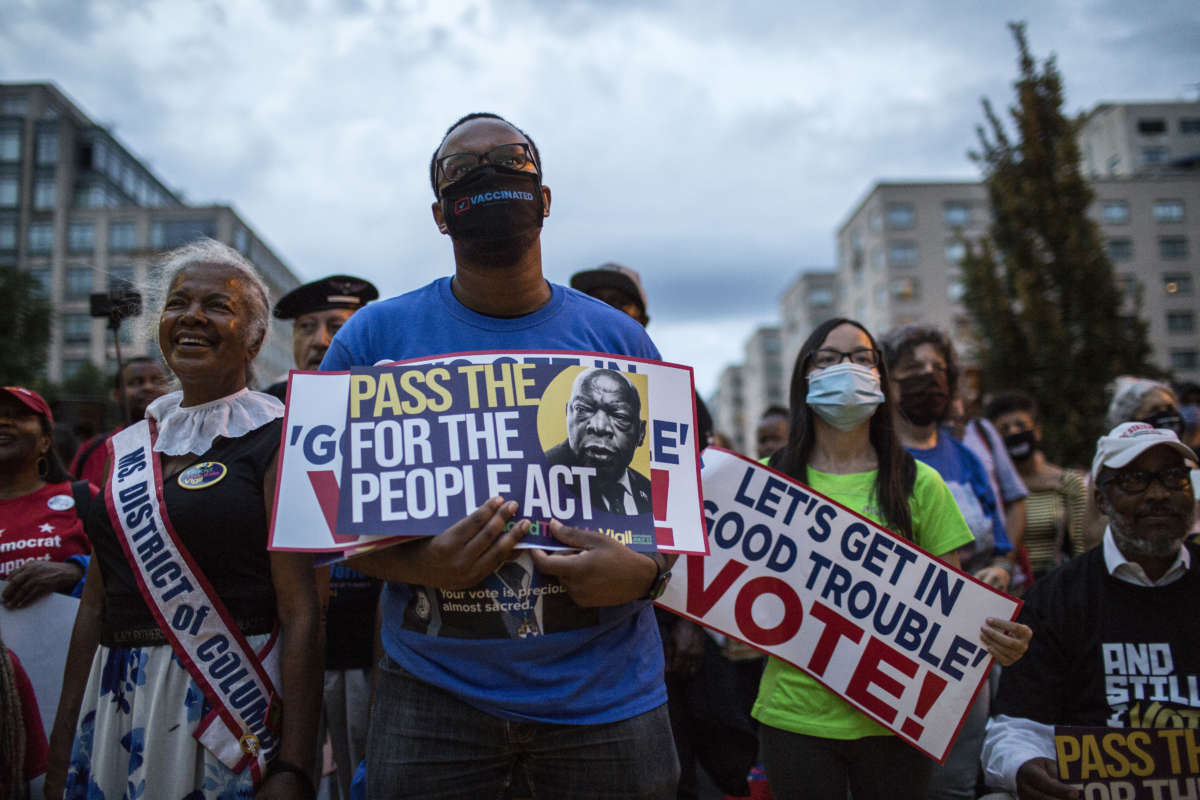Support justice-driven, accurate and transparent news — make a quick donation to Truthout today!
Big brand name companies usually try to create an impression that they stand for something besides simply making money. They often want to be perceived as having a social conscience and sharing the same values as their customers. But when it comes to standing up for their customers’ abilities to participate in the democratic process by easily voting, many companies have failed in recent months to take any action or even speak out.
As states have begun passing bills that will make it more difficult for people to vote, companies have been under pressure to stake out a position. More than a hundred businesses signed onto a letter endorsing the John Lewis Voting Rights Advancement Act, which would restore parts of the Voting Rights Act that were struck down by the Supreme Court, and others signed a pledge in support of the For the People Act, which would enhance voting access, prevent partisan gerrymandering, and more.
More than a dozen major brands have not done anything to stand up for voting rights, while in many cases directing PAC money to the state politicians behind the anti-voting bills, according to an analysis and scorecard from Greenpeace.
Companies that scored ‘Fs’ on the voting rights scorecard include:
- American Electric Power
- Altria
- Anthem Blue Cross
- AT&T
- Chevron
- Coca-Cola
- Comcast
- ConocoPhillips
- Delta
- Dominion Energy
- FedEx
- Home Depot
- Kaiser Permanente
- Koch Industries
- Marathon Petroleum
- Reynolds American
- UnitedHealth Group
- UPS
- Verizon
Scoring an ‘F’ on the analysis means the company has not signed statements in support of legislation to protect voting access, opposed the U.S. Chamber of Commerce’s position against the For the People Act, responded to Greenpeace’s letter of recommendations on how to protect voting rights, or taken any other pro-voting rights action.
Several of the failing companies have also been top PAC donors to the sponsors of the state anti-voting bills, Greenpeace found by analyzing contributions data from 2019 to the present for state house members and senators elected in 2020 and from 2017 to the present for those elected in 2018. Tobacco company Altria tops the list, having given more than $110,000 to the sponsors via its PAC, while companies in the top 10 include Anthem Blue Cross, Comcast, AT&T, Verizon, Dominion Energy, UnitedHealth Group, American Electric Power, and Reynolds.
According to the Brennan Center for Justice, 17 states have enacted 28 new laws that restrict voting access as of June 21, and more anti-voting bills are likely to be enacted this year. Most of the bills could make voting by mail more difficult by shortening the timeframe for voters to request mail ballots, limiting how mail ballots can be delivered, or imposing new ID requirements for mail ballots. Other laws could make in-person voting more difficult by requiring IDs, reducing early voting hours, and limiting the number of polling places.
The restrictive voting laws are generally believed to provide electoral benefits to Republican politicians, who typically benefit from low voter turnouts. Republicans tend to favor business-friendly policies on taxes and regulatory matters that may help the failing companies collect more profit in the coming years.
A terrifying moment. We appeal for your support.
In the last weeks, we have witnessed an authoritarian assault on communities in Minnesota and across the nation.
The need for truthful, grassroots reporting is urgent at this cataclysmic historical moment. Yet, Trump-aligned billionaires and other allies have taken over many legacy media outlets — the culmination of a decades-long campaign to place control of the narrative into the hands of the political right.
We refuse to let Trump’s blatant propaganda machine go unchecked. Untethered to corporate ownership or advertisers, Truthout remains fearless in our reporting and our determination to use journalism as a tool for justice.
But we need your help just to fund our basic expenses. Over 80 percent of Truthout’s funding comes from small individual donations from our community of readers, and over a third of our total budget is supported by recurring monthly donors.
Truthout has launched a fundraiser to add 500 new monthly donors in the next 10 days. Whether you can make a small monthly donation or a larger one-time gift, Truthout only works with your support.
